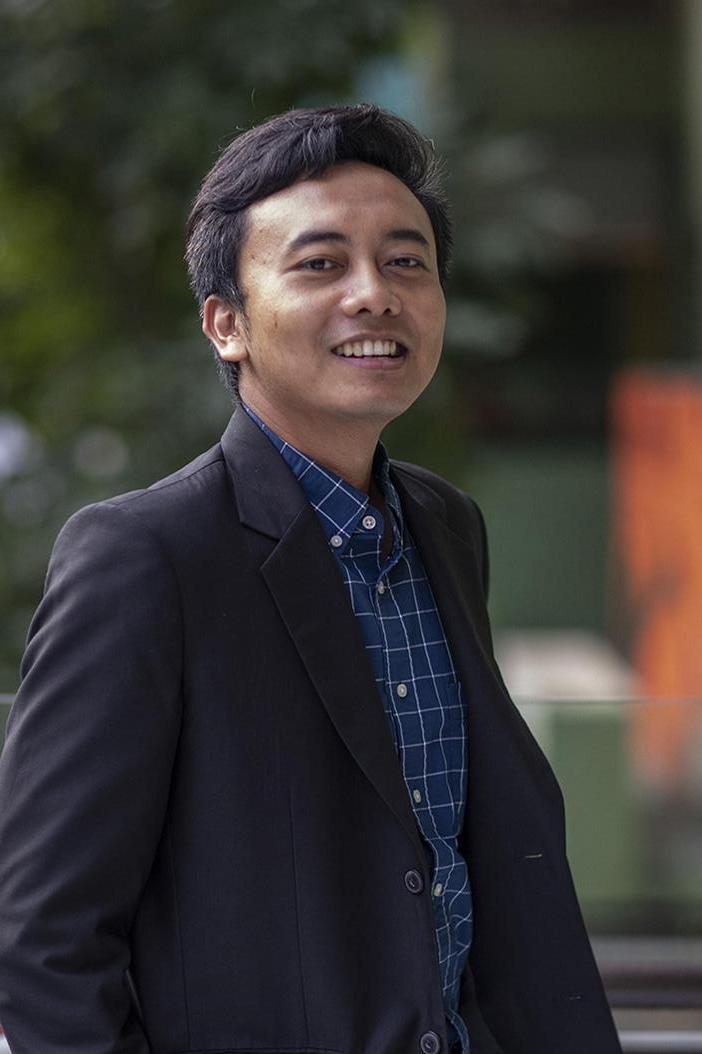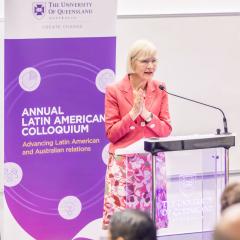
Imagine living in a city where it never floods in the wet season and a major river exists in harmony with a growing population. For Rian Mantasa Salve Prastica, this vision of carefully maintained water resources has led him to Brisbane to pursue a doctorate.
Rian's journey started when an aptitude test in high school identified his strengths and steered him towards further study in civil engineering.
In 2011, he was admitted to Sebelas Maret University in Central Java. During his time at university, he developed an interest in the water sector, which didn't appear to have a lot of enthusiasts. This was due to the challenging coursework and intricacy of water engineering.
Rian provided the example of how engineers must use historical data spanning the last ten years when developing water infrastructure. This is required to ascertain trends in the weather and changes in the climate, as well as the state of the surrounding land, water, and sediment. Only by understanding the historical information and studies can engineers develop suitable designs that prevent damage to rivers.
"Since there weren't many students concentrating on the water sector, I initially felt challenged. It turns out that the reason I haven't stopped being interested is that there are still a lot of other disciplines being explored, including chemistry and biology, which can be used to tackle issues in the water industry," Rian explained.
He graduated from the university with a perfect cum laude score and was the Best Graduate of Bachelor Study Programs in 2015. His bachelor thesis project, an analysis of sediment concentration in Bah Bolon River, North Sumatra, used seven methods of analysis and was published in two publications.
A year later, he received an LPDP scholarship from the Indonesian Government to continue his Masters at the University of Indonesia (UI) in Water Resources Engineering and Management. Again, he was the Best Graduate of Water Resources Engineering Program with a cum laude score. His thesis examined water quality modelling in urban lakes using numerical methods and conducting field studies and laboratory tests for data calibration.
Through a partnership between UI, IPB University, and Monash University under the Australia-Indonesia Centre, he established connections with Australia while pursuing his masters degree. Rian and his collaborators conducted research on water-sensitive cities, the concept of a city that never floods during the rainy season and never experiences drought during dry seasons.
"Green technologies, rain gardens that harvest rainwater and the use of plants around rivers can support the creation of water-sensitive cities," said Rian.
Choosing Australia
Following his involvement in collaborative research with Australian colleagues during his masters degree, Rian was determined to pursue a PhD in Australia through an Australia Awards Scholarship. He decided to attend The University of Queensland (UQ) in Brisbane. The two key factors were Brisbane's pleasant climate and the availability of academic supervisors who were experts in the issue he is exploring for his doctorate, which requires a synthesis of knowledge in numerical modelling, environmental design, and civil engineering.
"The topic revolves around the naturalisation of river areas," explained Rian, who began his studies in 2023.
"In Indonesia, this topic is somewhat sensitive because it has been raised on the political stage. But basically, concreted rivers have a bad impact on the environment, and there has been research on this."
When rivers are concreted, Rian says, the water quality declines. This can lead to the eradication of fish populations from rivers, which encourages mosquitoes to breed and can result in more mosquito-borne illnesses. In March 2023, he explained the issue and research on the topic in an article for The Conversation titled "Research proves that concrete river canals are difficult to reduce flooding and increase environmental problems".
Rivers in America, Europe, and Australia still frequently have concrete structures. While some nations are beginning to consider naturalisation, in Indonesia, the idea is still being debated due to the high costs involved.
Rian explained that river naturalisation affects the relationship between water, sediment, and vegetation in streams, helping rivers function well during dry and wet seasons. Experts who met in Brisbane to conduct a case study on the topic agreed.
"They strongly support the concept of naturalisation, which connects water, vegetation, and sedimentation," said Rian.
Admittedly, this subject is complicated. For instance, the vegetation must be arranged to efficiently trap sediments and water. Historical data on flood discharge must be studied and simulated to find an appropriate design. Rainfall in the catchment must also be calculated, explained Rian.
"The most extreme case of collecting data was when the rain started at 8pm and finished at 8pm the next day. To ensure the time interval, I jumped into the river and took samples in the middle where there was barely any light," Rian said.
Academic Networking
Rian's interest in nature-based alternatives to conventional engineering has led him to pursue a career and education in preserving urban waterway ecosystems from human-caused disasters and climate change triggers. He is currently a lecturer and researcher at the Polytechnic of Public Works in Central Java, which is affiliated with the waterworks construction technology study program.
A highlight of Rian's academic career in 2023 was a seminar in China. At the three-week International Workshop on Frontiers in Ecohydrology, he presented a paper titled "Water Sensitive Cities in Indonesia Megacities," highlighting his expertise in urban stormwater management and urban river naturalisation. He was one the youngest participants among experts from Asia, Africa, and Latin America.
Following this seminar, he also participated in the 9th International Conference on Climate Change, organised by Sebelas Maret University and Gifu University, Japan. He presented his part of a literature review on river naturalisation and its challenges during floods.
Everything he has achieved so far cannot be separated from his ability to build networks. Even his study at the University of Queensland began with a discussion over Zoom.
"Building a network can be done anywhere and at any time," Rian said.
"You don't have to meet in person either. Some networks even begin over emails and progress to writing journals or conducting research together."
This article was originally published by Australia Awards Indonesia.



